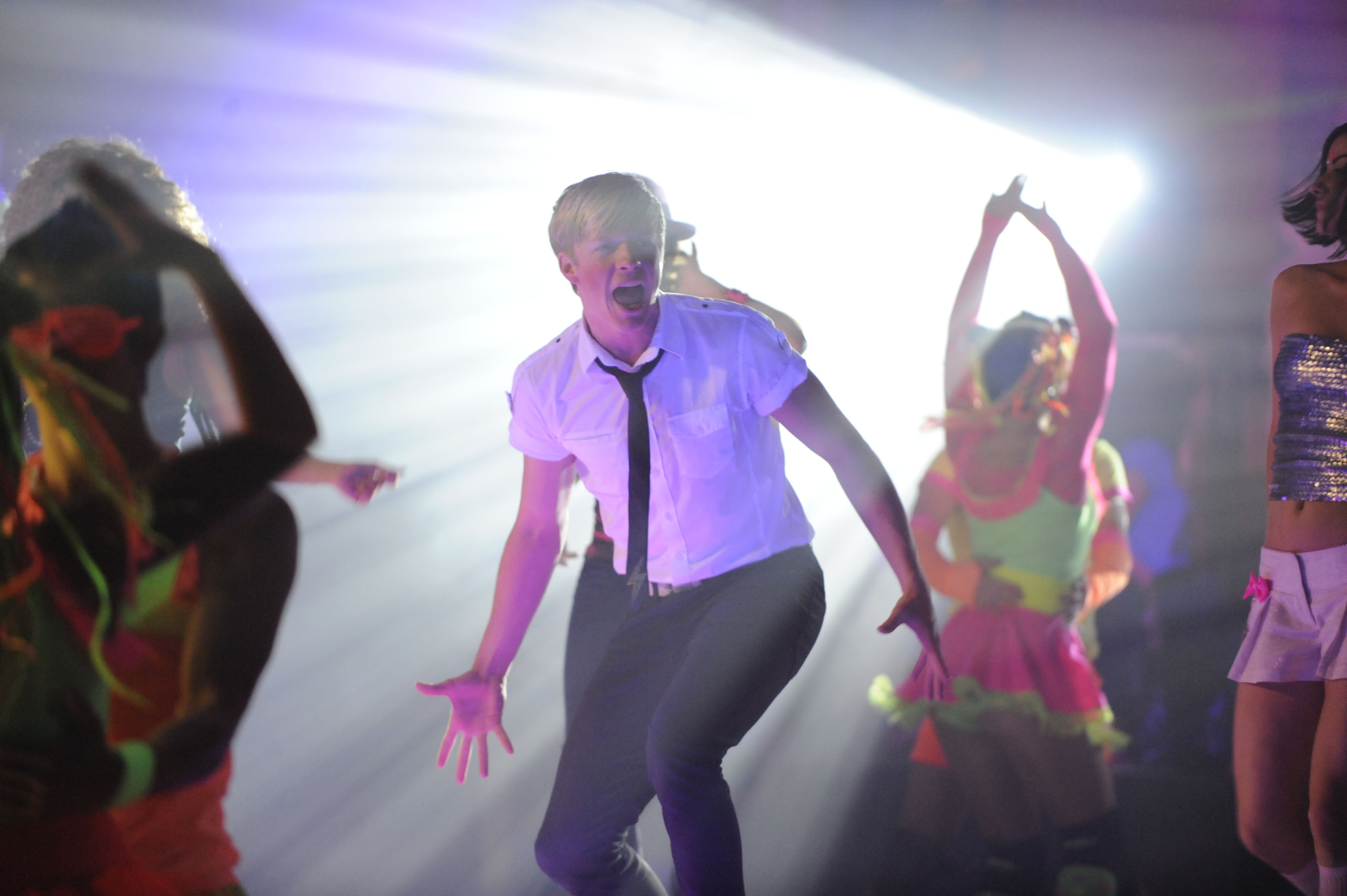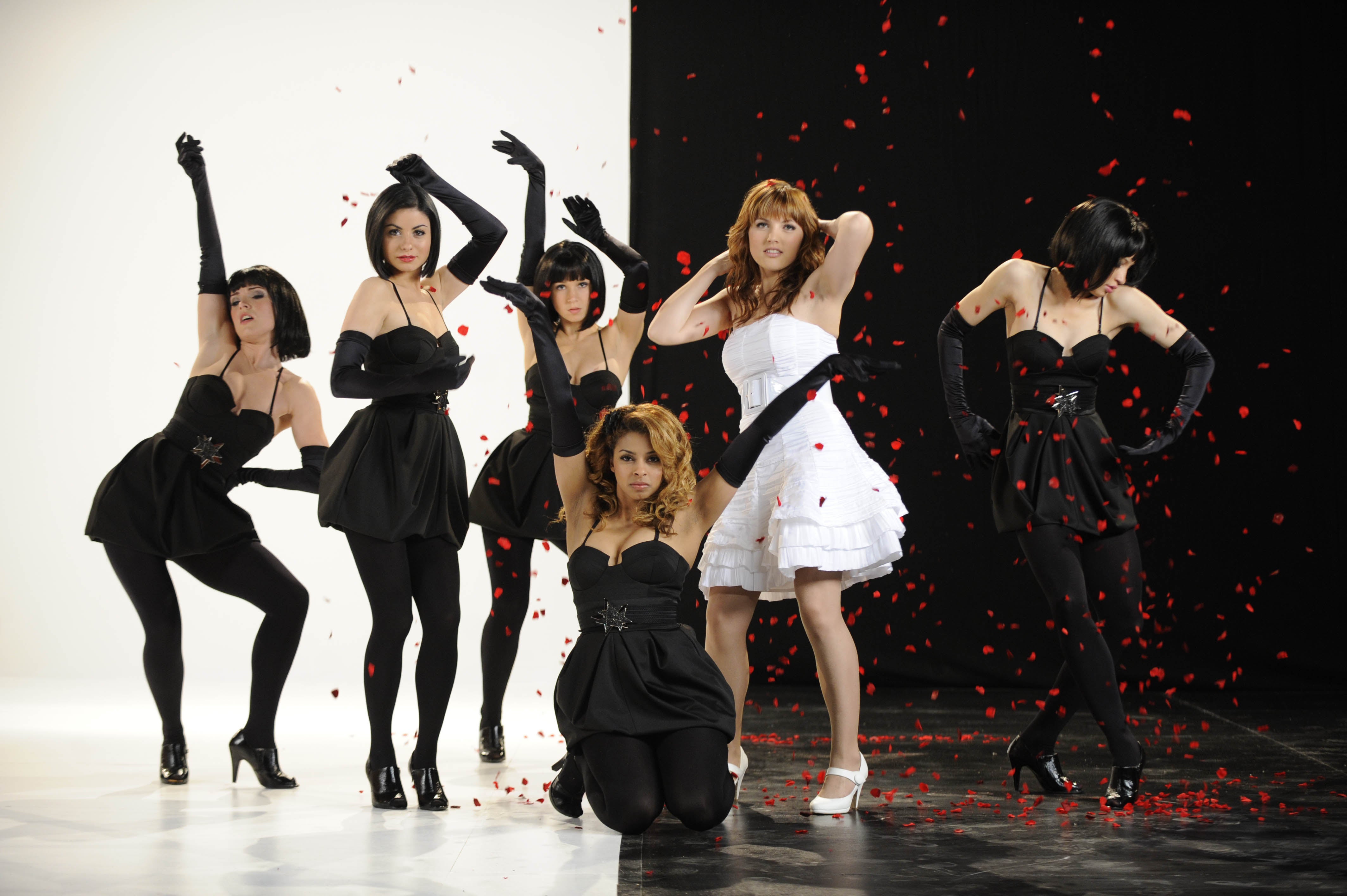Ed Sheeran auditioned and Gary Barlow wrote the songs: Why wasn’t Britannia High a hit?
With an all-star team including Gary Barlow and Arlene Phillips at the helm, ITV’s ‘Britannia High’ was meant to be ‘Skins’ with jazz hands, writes Isobel Lewis. Fifteen years on, the cast look back on what could have been, and how ‘intense’ auditions, drastic script changes and cast swaps pushed the show from a modern-day take on ‘Fame’ to a swiftly cancelled tween drama


Your support helps us to tell the story
From reproductive rights to climate change to Big Tech, The Independent is on the ground when the story is developing. Whether it's investigating the financials of Elon Musk's pro-Trump PAC or producing our latest documentary, 'The A Word', which shines a light on the American women fighting for reproductive rights, we know how important it is to parse out the facts from the messaging.
At such a critical moment in US history, we need reporters on the ground. Your donation allows us to keep sending journalists to speak to both sides of the story.
The Independent is trusted by Americans across the entire political spectrum. And unlike many other quality news outlets, we choose not to lock Americans out of our reporting and analysis with paywalls. We believe quality journalism should be available to everyone, paid for by those who can afford it.
Your support makes all the difference.It’s 2007. A 16-year-old with spiky ginger hair is trying to dance. As he awkwardly stomps his feet, you can practically see the cogs in his brain whirring. In front of him, an unimpressed Arlene Phillips shakes her head. “Not even an option,” she says, with a look of disdain. “Ed hasn’t a clue what he’s doing.” Nevertheless, her fellow judges – West End producer David Ian and music producer Chris Neil – see something in this scruffy young troubadour with two left feet. “His voice is what Britannia High is all about,” Neil insists, jumping to his defence. Fast-forward to 2023, and the boy who goes by the name Ed Sheeran is now one of the bestselling artists of all time, a Brit and Grammy Award-winning singer-songwriter who’s even popped up in Game of Thrones.
Britannia High, which arrived in 2008 and turns 15 today, failed to spot Sheeran’s talent. In the end, he was sent home from auditions for the ITV musical drama without a part. But that was the least of the series’ problems. Gruelling try-outs, last-minute casting swaps and a whole new script would be thrown in the team’s direction – and that was before filming even began.
It wasn’t supposed to be this way. When Britannia High shimmied onto our screens, replete with jazz hands and soaring sopranos, it was with a determination to do big things. Phillips and producer Ian, inspired by the success of High School Musical in the US, felt there was a gap in the market for a riotous new drama about a Brit School-esque performing arts college. As with HSM, the series would have a soundtrack of original songs. Writing them would be pop hit alchemist Gary Barlow.
For many millennials, mention of the words Britannia High unlocks a musical memory stashed deep in the brain. Say what you like about the show (and trust me, people did), but you can’t deny the catchiness of those tunes. For each viewer, a different toe-tapping track springs to mind: scintillating dance number “Body to Body”, dramatic duet “Watch this Space”, or soulful piano ballad “Proud”. “Every song that they wrote for that show was like, ‘That’s the best song I’ve ever heard,’” actor Matthew James Thomas, who played Jez, tells me from his home in the US.
The lyrics to theme tune “Start of Something”, echoed the show’s world-smashing plans: “This could be the start of something / I can feel my heart is jumping / Want to walk but can’t stop running.” Georgina Hagen, a musical theatre performer currently serving as resident director on Everybody’s Talking About Jamie, was just 16 when she was cast as series lead Lauren, the girl next door who gets into Britannia High without even needing to audition. The cast shared a “weird” excitement, she tells me, that “life could never be the same for us again after this… We may not be able to even walk down the street to get a cup of coffee without being recognised or being followed.”
Sadly, this wasn’t to be the case. Britannia High premiered in October 2008 to 3.5 million viewers (low for the time), plummeting to a meagre 1.3 million by the live finale, and the show was cancelled. Kinder critics called it “a soufflé of musical cheese”. In harsher circles, it was eviscerated by Charlie Brooker on his TV recap series Screenwipe, while The Guardian’s critic Gareth McLean questioned who the “excruciatingly clichéd” show was for. “I doubt that they are teenagers because Britannia High is far too juvenile,” he wrote.
But behind the scenes, much of the cast agreed with McLean. After all, the show they’d fought tooth and nail for a role in was “much darker” than the finished project, Rana Roy, who played ditzy dancer Lola, tells me. Everyone remembers that earlier version as an edgier, cooler show. Marcquelle Ward’s agent pitched it to him as a modern take on the original 1982 Fame series, while Thomas recalls it being “a little looser, a little more real”, the characters “a mess of amalgamated talent and hormones”. Mitch Hewer, who had recently achieved heartthrob status in the first generation of Skins, appeared to have been cast in an attempt to tap into that edgier teenage demographic. So why, by the time Britannia High was released, was it being referred to as a “family show”, airing in a Sunday pre-watershed slot as early as 5.30pm?

Hewer was the biggest name in the core six-person cast, getting an audition to play college hunk Danny because Phillips’s daughter had a crush on him. But despite the youngest cast members being 16 (legally old enough not to need a chaperone on set), these were experienced performers. Thomas, Hagen, and co-star Sapphire Elia had backgrounds in kids’ TV, while Roy and Ward had recently had their first shot at stardom on another of Phillips’s short-lived TV ventures, the BBC dance competition DanceX.
When Britannia High’s producers called in 140 people to auditions, they were in search of triple threats: people who could sing, dance, and act. Performers also needed to be able to withstand the camera’s constant glare, as the auditions were filmed for an accompanying documentary series. Thomas remembers being “a rather arrogant snob” about the meta reality element. In the end, his agent had to beg him, promising it was “the real thing”. “I was like, ‘That’s horrible. I like the privacy of the process,’” he says. Still, he went on to see “the potential” in the show. “To a young 18-year-old lad, it felt huge,” he says.

Watch Apple TV+ free for 7 days
New subscribers only. £8.99/mo. after free trial. Plan auto-renews until cancelled

Watch Apple TV+ free for 7 days
New subscribers only. £8.99/mo. after free trial. Plan auto-renews until cancelled
Competing against other “incredible, beautiful, extremely talented people”, the cast were put through the wringer. Hagen remembers it as “a marathon of an audition process”, of back-to-back dancing, singing and acting workshops. Prospective actors were constantly being introduced and discarded, with the core ensemble assembled in dribs and drabs. And yet, from the stress, friendships formed. Thomas shares a memory that sums up his experience (and 2007) in a nutshell: being sat in a grimy hotel room with Sheeran, the future popstar playing guitar while Thomas, naturally, beatboxed.
At that point, we didn’t really know each other... There was a lot of insecurity passing through
Sheeran being mocked for his inability to remember Phillips’s choreography remains one of the most memorable moments from the documentary. In another brutal scene, Phillips brands one auditionee a real triple threat: “Can’t dance, can’t act, can’t sing.” Thankfully, they’d already left the room. Ward, who would go on to play BB, remembers his “crazy” first round where a producer told the actors “yes” or “nope” to their faces on looks alone. Ward admits he didn’t help the tension backstage, and would psych out his fellow auditionees by doing riffs in front of the dancers and backflips in front of the singers. Sheeran wasn’t the only future star who didn’t make the cut. Hagen remembers auditioning with Pixie Lott and “being in absolute awe of her talent”. Other cast members competed in the room alongside JLS’s Aston Merrygold, X Factor star Ray Quinn, former Sugababe and Eurovision entry Jade Ewen and singer Bluey Robinson.
Hagen and Thomas were the first two to be cast, and made their way to songwriter Eliot Kennedy’s studio in Sheffield to begin laying down vocals. Elia, who played school mean girl Claudine, and Roy soon joined and the cast began to bond. Most exciting was the stint spent with Barlow and his Take That bandmate Mark Owen in a Bath studio belonging to, of all people, Peter Gabriel. It was one of those “epic” moments that sticks with the cast: no matter what happened afterwards, Thomas says, he always had that.
But then, things began to go pear-shaped. In contemporaneous interviews, producer Gareth Philips hints at chaos, with scripts being rewritten and “last-minute” character swaps. Thomas, for example, went from unofficially being told he’d be playing series lead Danny to the role of Jez overnight. Throw a curveball at a group of hormonal teens and twentysomethings, and things “can get dramatic pretty quickly”. “At that point, we didn’t really know each other, we didn’t really know what the reason was,” he says. “There was a lot of insecurity passing through.”

While nobody wants to point fingers (“I’m not throwing anyone under no buses,” Ward says), this was around the time that the original Britannia High script was swapped out. The show was moved to an earlier time slot and its “grungey feel” was replaced by something shinier. It was a “complete 180”, Hagen says. Rather than being a show for teenagers, this was aimed at pre-teens and their families.
Behind the scenes, with filming soon to begin in Manchester, the cast were reeling. Roy, who is now a directing fellow at the American Film Institute, remembers talking about the changes at the time. “I think we were all excited for the darker, more nuanced version and were quite shocked when that changed so close to when we started filming,” she says. For Thomas, the script changes not only sanitised the plot, but reduced the characters to broad stereotypes based on sexuality, race and gender. “The spectrum of people in those environments is extremely colourful and interesting, and just putting them into these six very old-fashioned ideas of character was a waste,” he says.
Rewatching Britannia High, you see a show that didn’t know who it was for. Bar the occasional sex references, this was a neutered version of adolescence that could be repeated on CITV if you beeped the word “b****” from the theme song. The series did have a bit of grit. Episode five of the show featured a gang violence storyline culminating in the murder of BB’s brother and the pumping Killers-inspired track “Fight Song”. It’s hard to believe, Ward tells me with a chuckle, but in the original series, this episode was “the lighter one”.
We were all excited for the darker, more nuanced version and were quite shocked when that changed so close to when we started filming
Another thornier issue that remained in the show – although not in the extremes of the original script – was the focus on Lauren’s body. In the first episode, Lauren panics that her crush Danny won’t be able to catch her in a dance routine, and eschews the cakes in the college canteen for a bottle of water. Hagen, then just 16, found this element “tricky to navigate”. But in the original version, she says, her character was actively berated by her teachers to lose weight. “I, at that point, was not overweight in the slightest,” she says. “If that had been done in this day and age, I feel like a lot of people maybe would have had a lot to say.”
Amid the chaos, the cast clung to each other. “Most of us lived together so there were definitely ups and downs,” Roy says. “We were in each other’s pockets, day in, day out,” Hagen adds, but “there was no time to argue… You just kind of had to put it to one side and crack on.” “We got each other,” Ward adds. “We just became moulded, at one point.”
The lengthy filming process wrapped, and the team waited for the show to be released. They knew Britannia High hadn’t quite lived up to its potential, but there was hope that the series could, maybe, find an audience who’d really love it. “Even I did at the time,” Thomas says. “I was extremely proud of what we did.” In the run-up to the show’s release, the cast got a taste of fame. They attended the National Television Awards, sat on the This Morning sofas, and saw their faces on billboards. But when their creation eventually aired, there was confusion. Was this a series for older teens or children? “It got caught somewhere between both of them, and so it kind of didn’t have an audience,” Thomas says.

Before the season was out, and with viewing figures dwindling, reports circulated that Britannia High had been cancelled. While Phillips hinted there was still “life”, in the show, it wasn’t to be. Britannia High shut its doors for good.
The frustrating thing, Thomas says, is that clearly “there was such a market” for the original premise; Glee arrived just one year later. “I do think we were a year early,” Ward reasons. “If we didn’t go into a recession, we’d have come straight back with a second season and third season, because we were all optioned for them. But that recession hit really big for everybody. The investors were like, ‘We gotta hang on a minute.’”
So no, Britannia High didn’t elevate its stars to stratospheric heights. But it did still change their lives. In the 15 years since, nearly all have straddled stage and screen. “It changed the path of my career completely and I’m so grateful for it,” Roy says. “I still see it as one of the best things that ever happened to me.” Hagen was “gutted” when the show wasn’t recommissioned, but says she “never would have got to do even half of the things” in her career without the show. “I learnt so much,” she says. “I made so many mistakes, oh my gosh, but then I learnt from them.” Even for the more critical Thomas, it was a lesson in standing firm in your convictions.
Last year, Sheeran was a guest on the Jonathan Ross Show sofa when the topic of Britannia High was raised, in an attempt to bring the popstar down a peg or two. “F***in’ hell, I knew you’d get this up,” Sheeran said, cringing as the audience whooped. Reminding viewers that he was just 16 at the time, he said self-effacingly, “You had to be able to act, dance and sing – two of which I couldn’t do.” Britannia High was a bump in what would go on to be a stellar career for Sheeran. “I do wonder, if we were to ever be in the same room again, whether he would recognise any of us, to be honest,” Hagen ponders. But for her, it remains a “core memory”. “We really bonded throughout that whole process because nobody knew which way it was gonna go,” she says. “It was intense, but it was so much fun.”
Join our commenting forum
Join thought-provoking conversations, follow other Independent readers and see their replies
Comments